UK Startup Plans Domestic Launchers for Future Spaceport

Artist rendition of the Orbital 500 launch vehicle. Photo: Orbital Access
[Via Satellite 08-11-2016] Scotland-based startup Orbital Access is designing a family of rockets to launch small payloads from the United Kingdom’s future spaceport, as well as other potential locations around the world. The first, an air-launched vehicle called the Orbital 500, aims to deliver a 500kg maximum payload to a minimum orbit of 650km. The company has the goal of conducting the first launch in roughly four years, and anticipates pricing for missions at around $30,000 per kilogram. The second is a long-term, more advanced system called the Future Small Payload Launcher (FSPL) that would use Reaction Engines’ Sabre engine.
Stuart McIntyre, CEO of Orbital Access, told Via Satellite that the company has defined the initial Orbital 500 launch system for which it is finessing the product development plan now. He described the Orbital 500 as similar in concept to Orbital ATK’s Pegasus launch system, in that it would use a conventional wide-body aircraft as an airborne launch platform carrier for a small payload rocket that would be launched at altitude.
“Our business model ultimately is focused on the delivery of launch services at horizontal takeoff spaceports,” said McIntyre. “It responds to the evident gap in the marketplace that shows the absence of launch operators for horizontal spaceports. Orbital Access’ business model is to provide those launch services.”
Orbital Access has raised capital from private equity sources in the U.K. along with U.K. Space Agency grant sources. McIntyre said longer term project and corporate finance would be raised traditionally on capital markets, and presumably with key corporate and agency participation.
“The project to create the Orbital 500 starts with mustering all the technical capabilities associated with each element of the system,” said McIntyre, listing these as the carrier aircraft, design and development of the rocket system, and completion of the propulsion system. “We have now assembled the principle technical partners associated with each element of the system, and are working with them to define the detailed product development plan for each aspect.”
| Interested in reading more stories like this? Sign up to our satellite news feed to get the latest satellite industry news right to your inbox! |
McIntyre said Orbital Access intends to complete the full product development specification by year’s end with partners, which the company anticipates will build confidence in future investors to raise the financial support necessary for the full project. Orbital Access has not revealed what partners will help build the Orbital 500, though McIntyre said partners for FSPL provide a clue. Organizations involved in FSPL include BAE Systems, Clyde Space, the University of Glasgow and others.
Orbital Access is still deciding what aircraft to use for the Orbital 500. McIntyre said a number of wide-body carrier aircraft are under consideration, with two options in the lead.
“We are looking for vehicles where we can mate the rocket in a centerline position under the fuselage. The optimum solution right now by our initial assessment is probably the DC10 or MN11 series,” he said.
McIntyre said Orbital Access’ principal goals today are to complete the specific definition of the Orbital 500 program, to commence the full-scale product development of that system with a view to entering the service in 2020, and to finalize the roadmap for FSPL.
“The FSPL project is slightly different in so far as it responds to the reality that as this industry progresses, price points are going to come down. Competitiveness in terms of small payload launch depends on new systems that will exploit new technology. The FSPL project is a U.K. Space Agency grant-funded project to define a long-term road map for future small payload launchers in the U.K.,” he said.
McIntyre added that the roadmap for FSPL should create the foundation for a series of subsequent launcher developments over the next two or three decades.While Orbital Access envisions the U.K. being a prime launch location for European and American customers, McIntyre said the company ultimately imagines using a global network of spaceports to serve markets in Europe, the U.S., the Middle East and the Asia-Pacific. Future partner launch sites could help the company conduct polar or equatorial launches in the time zones and regional economies where demand is coming from.
Orbital Access also has a partnership with Xcor, which McIntyre said is for human space launch with its Lynx spaceplane. He said the company sees human space research for scientists as a more significant market than space tourism, and that providing launch opportunities through multiple vehicles will enable Orbital Access to capture a larger swath of the launch market. Future vehicles could also join the list, he said, depending on demand.
“I think we will focus on additional partners in terms of people who can supply launch systems. We will develop those as we see the payload market demanding additional capabilities for services. At the moment we see with the Orbital 500 and with the Xcor system, a reasonably complete lineup. There may be other systems that ultimately come to the market, and if those represent a good commercial prospect, then we will certainly look at if they provide further value to our ‘launch services menu,’” he said.